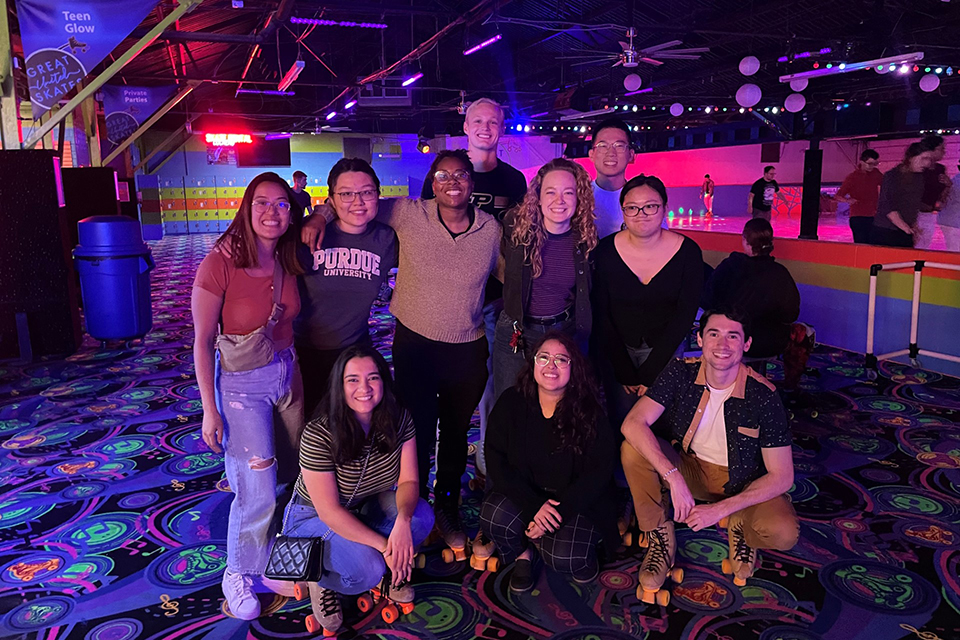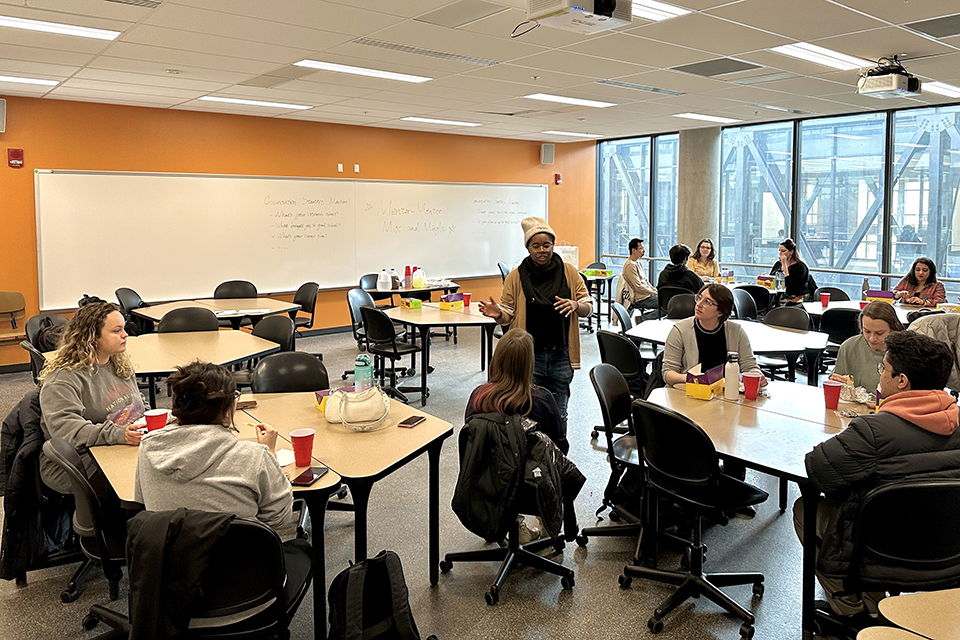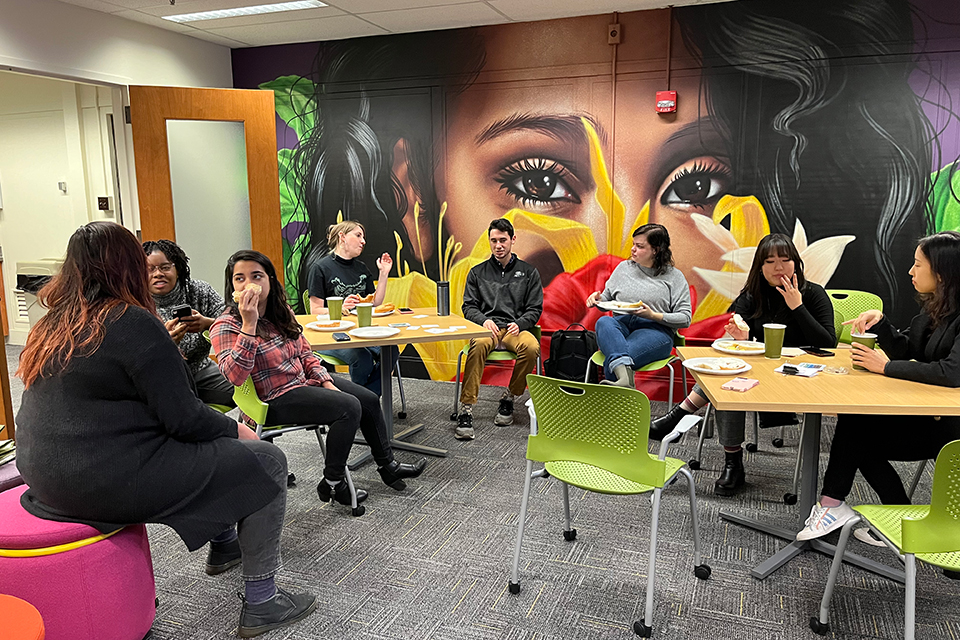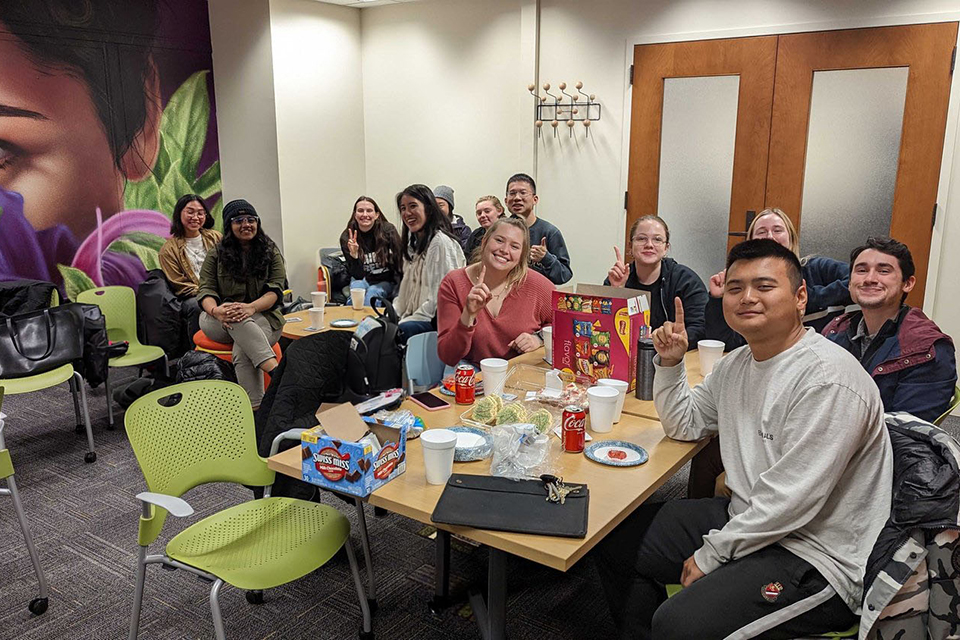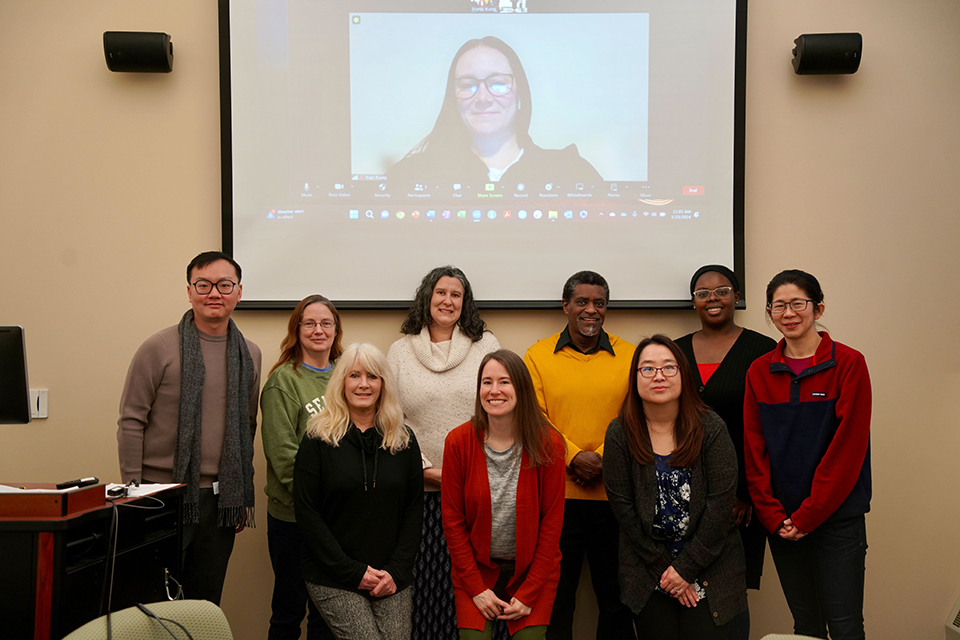
Mission Statement
The Department of Psychological Sciences values diversity, equity and inclusion in discovery, learning, engagement and community. Our department is committed to recognizing, confronting and reducing prejudice, intolerance and discrimination in both overt and subtle forms. We are also committed to identifying and combating systemic biases that are rooted in our structures, policies and practices. Together, our committee designs, implements and evaluates various initiatives with the mission to foster and sustain an inclusive community that welcomes and supports people from all social identity groups, especially individuals from underserved backgrounds.
Director and Committees
Director for Diversity, Equity and Inclusion
Franki Kung
Director for Diversity, Equity and Inclusion
Department of Psychological Sciences
Committees
Faculty and Staff Diversity, Equity and Inclusion Committee
- Eboni Bradley, graduate student (student liaison)
- Yu-Chin Chiu, assistant professor
- Heather Ciesielski, clinical associate professor
- Laurie Hitze, schedule deputy
- Teri Kirby, assistant professor
- Franki Kung, assistant professor
- Corrinne Lim-Kessler, lecturer
- Nancy O’Brien, program administration specialist and graduate coordinator
- Traci Puetz, administrative assistant
- David Rollock, professor
Graduate and Postdoctoral Diversity, Equity and Inclusion Committee
- Katie Adams (Social), postdoctoral scholar
- Sydney Aller, research technician
- Alisha Aroor (Neuroscience and Behavior)
- Caroline Balling (Clinical), events subcommittee chair
- Eboni Bradley (Social), faculty liaison
- Dante Bruno (Industrial-Organizational)
- Layla Dang (Social)
- Soyol Enkh-Amgalan (Neuroscience and Behavior)
- McKenzie Figuracion (Clinical)
- Andy Fordyce (Cognitive), committee co-chair and outreach subcommittee chair
- Regina Henares (Social)
- Shabeba Islam (Clinical)
- Mia Kendrick (Industrial-Organizational)
- Liz Noland (Social), mentorship subcommittee chair
- Adilene Osnaya (Clinical), committee co-chair and treasurer
- Rick Yang (Industrial-Organizational)
- Junming Zhang (Social)
DEI Program Highlights
Purdue Psychology Mentorship Program
The Purdue Psychology Mentorship Program facilitates and provides resources for graduate-to-undergraduate and graduate-to-graduate student mentoring. The program welcomes all students, especially students of underrepresented and marginalized identities, with the aim to foster inclusivity and equity in the rising generations of psychology scholars, clinicians and industry leaders. The mentorship subcommittee organizes multiple events each semester for students to enjoy food, games, socializing and sharing experiences. Sign up online to learn more, connect and find your community.
Social Gatherings and Community Building
The committee organizes regular social gatherings to connect people and foster community across areas of the department. Past events have included fun activities, such as trivia, board games and pumpkin painting, accompanied by snacks such as local craft pizzas, a taco bar, acai bowls and boba. The lounge area offers games and snacks and is regularly utilized as a communal space for DEI events; lab activities; and spontaneous conversations, lunches, co-working time and meetings.
Hidden Curriculum Panel Series
The committee has launched a series of hidden curriculum panel events to address some of the unwritten, unofficial and often unintended lessons, values and perspectives. The goal is to increase accessibility of important knowledge and resources for the success of all graduate students. Graduate students also share a Slack channel across focus areas to communicate, organize events and distribute information in the form of a monthly departmental DEI newsletter to share related events and resources.
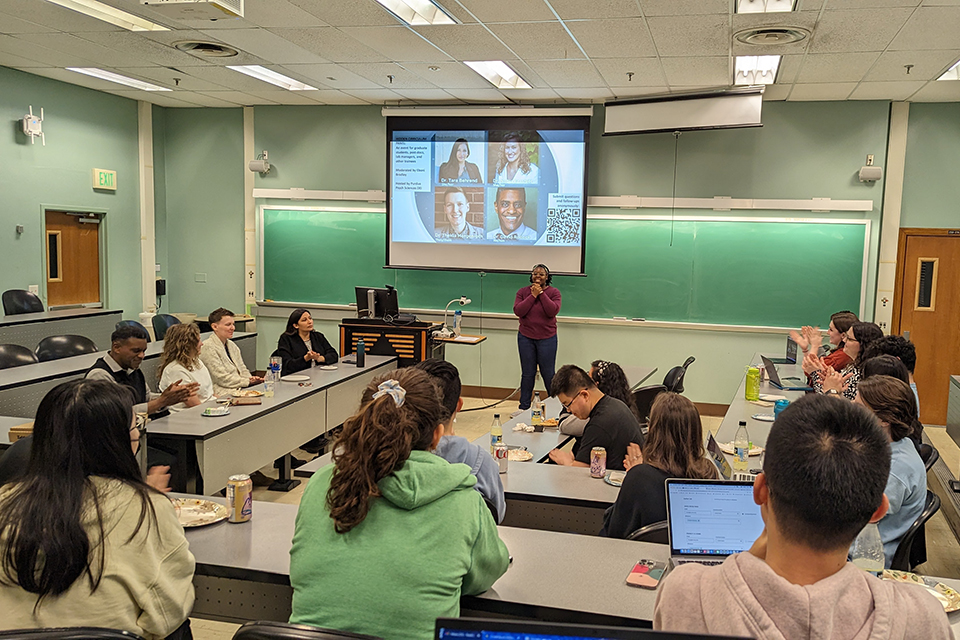
Spotlight Student Stories
DEI Programs and Learning
As a student in the Department of Psychological Sciences, you’ll have a variety of opportunities to grow your diversity, equity and inclusion (DEI) knowledge within your field of study, from courses with a DEI emphasis to department-specific DEI programming.
Undergraduate Students
Undergraduate Mentorship
Courses with emphasis on diversity, equity and inclusion
- PSY 24000 (Introduction to Social Psychology)
This course offers a broad survey in current knowledge about human social behavior. Topics covered include aggression; attraction and love; social influence; attitudes and attitude change; nonverbal communication; leadership; prejudice and discrimination; and application of social psychology to law, medicine and other fields. - PSY 33500 (Stereotyping and Prejudice)
This course examines the topics of stereotyping, prejudice and discrimination from a social psychological perspective. Relying on empirical findings and relevant theoretical approaches, the course moves beyond lay opinions to explore the social psychological foundations and forms of stereotyping and prejudice and to examine various strategies for reducing intergroup biases. - PSY39200PG (Psychology of Gender)
Explore how gender affects the experiences and lives of all people. Covering classic theories as well as the latest research on gender, topics will include: What is gender and (how) is it different from biological sex? What are gender stereotypes, where do they come from, and why are they harmful? These questions will be examined broadly as well as within specific domains such as gender in the workplace, gender and sexuality, and gender and in childhood. Students will be expected to actively engage in discussions about these topics, their practical implications, and potential solutions. Students will also learn to critically engage with psychological research on gender and how it can reinforce systems of inequality — for example by treating gender as a binary variable or ignoring the experiences of individuals with multiple intersecting identities (e.g., Black or lesbian women). - PSY39200CP (Cultural Psychology)
This course introduces students to the field of cultural psychology. Students will learn about the major theories and issues in cultural psychology, including cultural intelligence. It will explore how culture influences behavior and social interactions in order to highlight cultural understanding. Some of the course topics will include looking at culture’s influence on self (identity), cognition, communication and mental health. Students will utilize critical thinking skills in order to identify sound research methodology and data analysis in the field. - PSY 39200 (Diversity and Inclusion)
Topics may change from semester to semester and are presented by Department of Psychological Sciences faculty. - PSY 43200 (Social Psychology in Film)
This course examines theory and research in experimental social psychology and uses popular films to assist in provoking thought and analysis of the theory and research. - PSY 46400 (Research Ethics in Psychological Sciences)
Research ethics broadly refers to the application of everyday values, such as fairness, honesty and objectivity, to scientific research. This course is designed to provide broad coverage of the ethical standards that research scientists must follow and allow exploration of various real-world ethical issues in the psychological sciences.
Purdue research opportunities for minority students
Graduate Students
Organizations
Courses with emphasis on diversity, equity and inclusion
- PSY 59100 (Seminar on Ostracism)
The aim of this course is to introduce students to the theories and research on ostracism, social exclusion and rejection as well as the impact of inclusion (and possibly over-inclusion). Theories, paradigms and research developments will be introduced through lectures and readings. You will hone your critiquing and presentation skills and develop and receive feedback on your creative and theory-advancing group projects and presentations. - PSY 59100 (Cross Cultural Social Psychology)
This seminar examines the impact of acceptance and inclusion (or lack thereof) in several contexts. Course topics include the psychology and neuroscience of belonging and acceptance; the polarization that often occurs when people discuss issues of acceptance and inclusion; how internet access affects attitudinal polarization; sex differences, stereotyping and possible bias in science, technology, engineering and math (STEM) contexts; workplace issues and interventions related to increasing diversity; issues of inclusion, student success and free speech on college campuses, such as Purdue; and marginalization in voting behavior and citizenship status. - PSY59100DS (Diversity Science)
Students will be introduced to the emerging subfield of diversity science within social psychology. The course will cover overarching theoretical perspectives relevant to diversity, as well as empirical findings that have real-world significance. For example, students will learn about cultural models for thinking about diversity and difference, as well as how different identities shape people’s experiences in society. Throughout the course, they will learn to critically analyze research and formulate their own research ideas. - PSY59100PG (Psychology of Gender)
Grad level course exploring how gender affects the experiences and lives of all people. Covering classic theories as well as the latest research on gender. - PSY 63000 (Stereotyping and Prejudice) — counts toward the Inclusive Excellence Graduate Certificate
This course provides an in-depth examination of issues related to stereotyping, prejudice, and discrimination. After a general introduction and historical overview, students will be exposed to a detailed study of the social psychological foundations of stereotyping and prejudice to include their impact and reduction strategies. - PSY 64000 (Survey of Social Psychology)
This course offers an extensive survey of methods, research and theory in social psychology. - PSY 68200 (Culture and Diversity at Work) — counts toward the Inclusive Excellence Graduate Certificate
This course aims to familiarize graduate students with the basic theoretical and methodological issues in the scientific study of culture and diversity in organizations. Readings are drawn primarily from the socio-organizational psychology and organizational behavior literature. Discussions focus on contemporary questions related to the understanding and management of diversity in the workplace: What is culture/diversity? How do psychologists approach these constructs? Why does diversity lead to both synergy and problems? How can people and organizations transform cultural collision into synergy? Given most psychology research been largely developed and tested in WEIRD (i.e., western, educated, industries, rich and democratic) populations, discussion will focus on the extent to which a phenomenon will translate across cultural and majority/minority groups. - PSY 69200 (Ethnic Minority Issues)
This seminar provides an introduction to roles of ethnocultural experience in psychological phenomena, particularly as they address foundations for the science and practice of professional psychology. The course focuses on American domestic minority group members of African, Asian, Hispanic/Latinx and Native American Indian/Alaskan Native heritages. Intersections of ethnicity and culture with other key demographic and socialization characteristics that shape behavior also will be considered. Readings, presentations and exercises will explore basic paradigms and research methods to characterize behavior, socialization and normative human development, social relations, adjustment and psychopathology, and educational and community intervention.
Faculty
In their persistent pursuit of improving health and well-being, many faculty members in the Department of Psychological Sciences specialize in topics related to diversity, equity and inclusion across a variety of research areas.
The following members of the department have expressed that they have expertise and/or interest in research, teaching, and/or engagement in DEI:
- Ximena Arriaga, Professor (Inclusive and Supportive Contexts)
- Jennifer Brown, Associate Professor (Culturally-Adapted Interventions, Cultural Consensus Modeling)
- Heather Ciesielski, Clinical Associate Professor, Director of Purdue Psychology Treatment and Research Clinics (Culturally-Informed Clinical Care, Psychological and Biomedical Ethics)
- Jill Gulker, Clinical Assistant Professor (Culturally Responsive and Inclusive Teaching)
- Bridgette Kelleher, Associate Professor (Neurodiversity, Telehealth/Access)
- Corrinne Lim-Kessler, Lecturer (Cultural Psychology, Inter-Cultural Awareness)
- Teri Kirby, Assistant Professor (Diversity Initiatives, Identity, Intergroup Relations)
- Franki Kung, Assistant Professor, Co-Director of HHS DEI Science Consortium (Asian Perceptions, Multicultural Workplace, Diversity and Inclusion)
- Margo Monteith, Distinguished Professor; HHS Associate Dean for DEI (Confronting and Reducing Bias [e.g., stereotyping], Fostering Inclusion and Belonging)
- Thekla Morgenroth, Assistant Professor (Gender, LGBTQ+ identities)
- David Rollock, 150th Anniversary Professor (Acculturation, Interethnic Contact and Discrimination)
- Doug Samuel, Professor (Equity/Bias in Mental Health Diagnosis)
- Louis Tay, professor (Equity/Bias in Assessments, ML, and Well-Being)
- Sang Woo, professor, chair and director of Susan Bulkeley Butler Center for Leadership Excellence
Explore the list of faculty members currently accepting undergraduate students as research assistants in their labs to learn how to get involved. See also resources from Purdue’s Office of Undergraduate Research for information, support, and seminars on how to approach selecting and working with a faculty member on research, make the most out of a research experience, and explore other resources such as fellowship opportunities.
Input and Suggestions
We welcome you to submit feedback, concerns and suggestions regarding diversity, equity and inclusion relevant to the Department of Psychological Sciences through this online form (you have a choice to be contacted or remain anonymous). You may also email the director (Franki Kung), email the faculty and staff committee, or email the graduate and postdoctoral committee directly. Your submission via the above means will be reviewed and may be brought forth to the departmental diversity, equity and inclusion committee and/or other appropriate parties for discussion and action planning. If you have specific requests about who the submission is or is not to be shared with, please let us know. We appreciate your time to provide your input.
